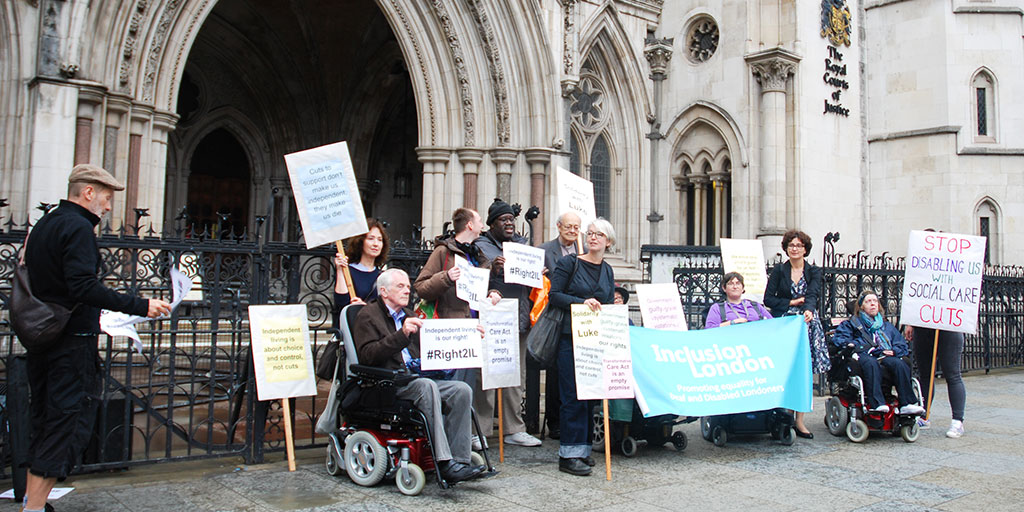A Disabled man loses his court battle for a right to live an ordinary life
The Court of Appeal has delivered its judgement in the case of R (on the application of Davey) v Oxfordshire County Council). This is the first case under the Care Act 2014 to reach the Court of Appeal and is critical in determining how far the legislation supports Disabled people’s well-being, choice and control and independent living. The judges dismissed the appeal mainly because of the factual evidence in the case.

Today, on the 1st of September 2017, the Court of Appeal delivered its judgement in the case of R (on the application of Davey) v Oxfordshire County Council). This is the first case under the Care Act 2014 to reach the Court of Appeal and is critical in determining how far the legislation supports Disabled people’s well-being, choice and control and independent living. The judges dismissed the appeal mainly because of the factual evidence in the case.
The case was brought by Luke Davey, a Disabled person with high support needs, whose support package has been slashed after the closure of the Independent Living Fund (2). The Equality and Human Rights Commission and Inclusion London (3) both intervened in the case, which highlights the situation many Disabled people are going through at the moment with care packages being cut to the bone by cash strapped Local Authorities.
Svetlana Kotova, Disability Justice Co-Ordinator at Inclusion London said
“We are very disappointed with today’s decision. This judgement illustrates the devastating impact of the Government policies on Disabled people. Many Disabled people like Luke Davey, who were supported by the Independent living Fund had their support packages cut to the bare bone. With those cuts went their independence, choice and control and the opportunity to live a normal life. Today the Court of Appeal confirmed that local authorities can get away with doing this.
“Without adequate levels of support more and more Disabled people are existing not living. This is one reason why yesterday the UN Committee on the Rights of Persons with Disabilities said social cuts in the UK have led to human catastrophe.
“This case has destroyed any hopes that the Care Act 2014 will transform our experience of social care. It shows how easily local authorities can override disabled people’s about what’s good for us.
“It is time the Government recognises and urgently addresses the huge crisis in social care. through ensuring adequate funding and the introduction of an appeals system, which would give Disabled people a fair chance to challenge the views and decisions of social workers”.
For more information and to arrange interviews please contact Svetlana Kotova: Svetlana.kotova@inclusionlondon.org.uk 07853246229
Notes to Editors
(1) The initial decision in the Davey case could be found here http://www.bailii.org/ew/cases/EWHC/Admin/2017/354.html
(2) The Independent Living Fund was closed in June 2015 with responsibility for meeting the full care and support needs of Disabled people transferred to Local Authorities and the devolved administrations. Evaluations of its closure have revealed a dramatic post code lottery with some English Local Authorities making substantial cuts. Research carried out by Inclusion London looking at the situation for ex-ILF recipients one year after closure points to the lack of enforcement measures in the Care Act 2014 and due to the loss of entitlement to legal aid the difficulty people face in making a legal challenge against cuts:
https://www.inclusionlondon.org.uk/news/ilf-one-year-on/. The government’s own evaluation records serious negative impacts: https://www.gov.uk/government/uploads/system/uploads/attachment_data/file/584417/independent-living-fund-post-closure-review.pdf
(3) Inclusion London intervention was supported by Deighton Pierce Glynn. Inclusion London is a London-wide Deaf and Disabled people’s organisation. We promote equality for the capital’s 1.2 million Deaf and Disabled people and provide capacity-building support to London’s Deaf and Disabled people’s organisations. For more information: www.inclusionlondon.org.uk.
(4) The UN Committee on the Rights of Disabled People issued its concluding observations after examining the UKs record on upholding Disabled People’s Rights guaranteed in the UN Convention on the Rights of Persons with Disabilities. Among other matters it raised specific concerns about the worsening situation with Disabled people’s right to Independent Living. See paras 44 and 45 here: http://tbinternet.ohchr.org/_layouts/treatybodyexternal/SessionDetails1.aspx?SessionID=1158&Lang=en
(5) Section 72 of the Care Act contains provisions about the appeals process. However, the Government did not commence them.